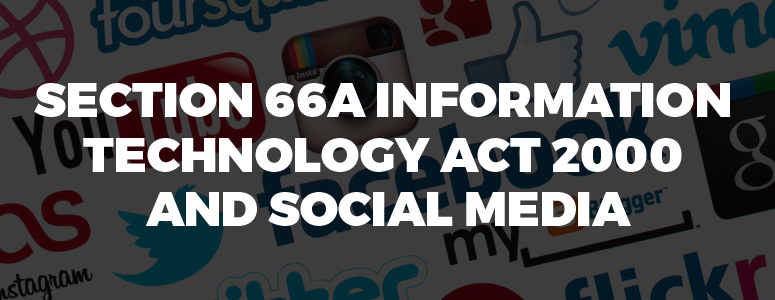Section 66A Information Technology Act 2000 and Social Media
The Information Technology Act was enacted in the year 2000 to handle and tackle the new issues arising out of computer technology and more particularly the internet. Section 66 A was added to the said Act vide an amendment in 2008 when Section 66 itself was found insufficient to handle all the issues arising out of the use of the internet. Section 66 A of the IT Act reads as under:
Section 66A:
Punishment for sending offensive messages through communication service etc.
Any person who sends, by means of a computer resource or a communication device,
- Any information that is grossly offensive or has menacing character, or
- Any information which he knows to be false, but for the purpose of causing annoyance, inconvenience, danger, obstruction, insult, injury, criminal intimidation , enmity, hatred, or ill will, persistently makes by making use of such computer resource or communication device.
- Any electronic mail or electronic mail message for the purpose of causing annoyance or inconvenience or to deceive or to mislead the addressee or recipient about the origin of such messages.
Shall be punishable with imprisonment for a term which may extend to three years and with fine.Explanation
For the purposes of this section terms Electronic mail? and Electronic Mail Message? means a message or information created or transmitted or received on a computer, computer system, computer resource or communication device including attachments in text, image, audio, video and any other electronic record, which may be transmitted with the message.
This section by its interpretation is wide enough to cover all kinds of messages, mails, comments which can be offensive or unwarranted. The message can be in form of text, image, audio, video or any other electronic record which can be transmitted. In the current scenario such sweeping powers under the IT Act provides a tool in the hands of the Government to curb the misuse of the social media in any form. The original Section 66 of the IT Act 2000 was limited to extent of handling the offenses of hacking which proved to be ineffective in tackling the problems of wrongful emails, messages and campaigns on the social media like facebook. This amendment was brought in and Section 66A of the IT Act was inserted in the statute book to tackle all such kinds of problems on the internet. By its simple definition the Section 66 A of the IT Act gives widest powers to stop any kind of objectionable email, messages on the social media, SMS etc. Some critics have come out very heavily on Section 66A of the IT Act claiming that it is draconian and prone to be misused by the law enforcing machinery. Such absolute powers in the hands of law enforcing machinery may jerpardize the freedom of expression or the right of freedom of an individual is the moot point now.
One has to see this Section 66A Information Technology Act 2000 and Social Media from the point of view of the freedom of expression granted under the Indian Constitution which is based on the principles of co existence of the rights of the fellow citizen and the State. Freedom of expression is not an absolute freedom which anybody can claim to enjoy in disregard of the existence of others rights of the duties of the state and the public order. It is always subject to certain restrictions which the State may impose in the interest of the citizen or the country.
The original Section 66 of the IT Act was intended to handle the problem of hacking and other related aspects but the insertion of Section 66A of the IT Act subsequently it is now equipped to handle even the social media which may be a matter of concern for all of us. Thus Section 66 A of the IT Act now empowers the law enforcing machinery to take legal action against any offensive, unwarranted comment, material or exposure to the extent that it may jeopardize the freedom of expression as enshrined under Article 19 (1) (g) of the Indian Constitution and right to personal liberty as enshrined under Article 19 of the Constitution of India. If taken to judicial determination, this section may not sustain the rigors of and may be struck down by any court.
We have inhouse online Indian IT lawyer for all legal services and advice on Section 66A Information Technology Act 2000 and Social Media. Contact us for any such services.

